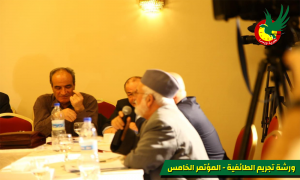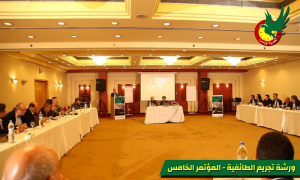The Fifth Conference for the National Unity Workshop and the Criminalization of Sectarianism.
Cairo, March 25, 2013.
The National Unity Workshop and the Criminalization of Sectarianism held its Fifth Conference today, Monday, March 24, in Cairo.
Under the title "Two Years Since the Syrian Revolution – Reviews and Approaches."
The conference was attended by sixty-five Syrian national figures who enriched the dialogue with ideas, suggestions, and proposals that serve the revolution and contribute to resolving the Syrian crisis. Among them were the active writers Fayez Sara and Michel Kilo, activists Fares Al-Shoufi, Najati Tayara, Tarek Houkan, Saba Khaddour, Abdel Karim Al-Agha, Riad Darar, the human rights activist and president of the Arab Organization for Human Rights in Syria, Rassem Al-Atassi, General Mohammad Al-Haj Ali, and other activists and human rights defenders, in addition to the workshop coordinator, academic Dr. Socrates Al-Baaj.
The conference activities were held in three sessions as follows:
Session One:
Research papers were presented, followed by discussions on the topics proposed by the National Unity Workshop and the Criminalization of Sectarianism, focusing on ways to activate them and make the most of their potential:
1- Creating sectarian factors and exploiting them in political maneuvers and international and regional alliances.
2- Separatist ideas and how to preserve the unity of Syrian territory.
3- Avoiding the extension of the Syrian crisis to neighboring countries.
4- The role of civil society organizations in the upcoming phase.
5- The structures of national reconciliations and their role in securing stability.
6- The proposed structures for managing the transitional phase.
Session Two:
During this session, a connection was made via Skype with one of the leaders of Jabhat Al-Nusra in Syria, Abu Obaida Al-Muhajir, followed by a connection with Sheikh Ahmed Al-Shami after the line was interrupted. Then, a call was made to Sheikh Adnan Al-Arour. Afterward, an intervention was given by the Lebanese Shiite scholar, Hani Al-Faqih, who was present at the conference. Al Jazeera Mubasher broadcasted the conference live.
1- Call with "Abu Obaida Al-Muhajir" from Jabhat Al-Nusra:
Abu Obaida Al-Muhajir began his speech — in clear Syrian dialect, after greeting the attendees of the conference — with a pledge, stating: "We pledge not to harm anyone from any sect in Syria, and we will hold accountable anyone from any sect in fair courts."
He then spoke about the rumors spread by the regime and its conspirators, aimed at instilling fear of Islam and Muslims. He emphasized that these rumors "are untrue, as our righteous religion forbids us from any action that contradicts the law of Allah."
He then praised the meeting of the Alawite brothers, saying: "We support the step taken by our Alawite brothers, and we bless their initiative and their conference. We hope you will convey this message to the Alawites inside, and we assure you that we will not hold anyone accountable for the crimes of others."
The connection with Abu Obaida Al-Muhajir was then cut off, and Sheikh Ahmed Al-Shami continued the communication. Some attendees asked him about concerns, such as the future of non-Syrian fighters in Syria after liberation. He responded, "What is the reward for good except good? Whoever wishes to remain in Syria may stay, and they will have what we have, and they will bear what we bear."
Regarding another question from Mr. Najati Tayara about the legal foundations for the Islamic courts, he answered that this would be left to the specialists who handle such matters.
2- Call with "Sheikh Adnan Al-Arour":
Through his connection with the conference attendees, Sheikh Adnan Al-Arour — after greeting everyone — sent messages regarding several important points. Below are the key topics he addressed:
"I thank all the attendees for their efforts in supporting the revolution, working to overthrow the regime, establishing solid foundations for coexistence, spreading peace, and achieving justice."
"I thank the conference and the attendees from the Alawite community, and I warn the sect about the trap the regime has set for them by involving them in its actions in Syria. It would be better for them — at the very least — to remain neutral, if not to stand with the revolution. Everyone knows that this regime has aimed to make it sectarian from the beginning. It is also well known that many members of the Ba'ath Party have participated and are still participating in the revolution."
"The regime tried to accuse the revolution of extremism and to label us as sectarian in order to launch a criminal war against the Syrian people."
Our religion is a religion of love and justice, and there are many verses that command this, such as: 'Indeed, Allah commands justice' and other similar verses.
The Syrian people are a people of understanding and dialogue. Talking about exclusion is an act known only to this regime. Oppression and violence have no place in Islam. We must stand united to fight sectarianism, just as the Crusades were sectarian wars.
The presentation of issues for discussion is important, and leaving them unaddressed is a mistake. As Muslims, if we discuss their beliefs, this does not imply that we are sectarian; rather, it falls under the category of academic discussion and debate only.
Removing barriers between sects is essential, and this can only be achieved through dialogue and the use of speech. This is a critical issue, and the first to violate it was the regime, which opened fire on the protesters who were chanting for their rights.
I would like to point out that the legal ruling is for the specialists, and it is not for the brigades to judge anyone, as it is not permissible in the religion of God to wrong anyone.
Those who stir up tribal and nationalist strife are the ones who harbor ancient hatred. Here, I remind you of the Quranic verse: "O mankind, indeed We have created you from male and female and made you peoples and tribes that you may know one another. Indeed, the most noble of you in the sight of Allah is the most righteous of you." Know one another, understand each other, and coexist. A person should not be held accountable for the wrongs of their brother or father.
We aspire to a country where citizenship belongs to all, where human rights are available to everyone, and where freedom is the right of all. Peace be upon you.
3- Intervention by the scholar Sheikh Hani Al-Faqih (one of the prominent Shiite scholars):

He spoke about important and serious issues concerning Shiites in Arab countries, as well as their stance towards Iran. He began his speech by stating that he does not hide the fact that he is a Shiite.
Here is a summary of the key points from his speech:
– I did not wish to participate, but there is a need to clarify some matters. I do not want to appear as a traitor to the Shiites, nor do I want you to call me a traitor.
– Nouri al-Maliki is the one who said that the Syrian regime is a terrorist regime.
– The Iranian state is a state that works for its own interests; it is neither Shiite nor Islamic. There must be action against the Iranian project. There is no Arab project for Iraq, and it has been left as an easy target for Iran, with American and Iranian collusion over Iraq.
– The Arabs abandoned Lebanon and left it as an easy target for Iran.
– Unfortunately, Muqtada al-Sadr is in the hands of the Iranians.
– It is essential to manage differences with wisdom, and the Sunni majority needs a mindset equal to its share.
– The relationships between Hezbollah, Iran, and Al-Qaeda are deeper than we imagine.
– The Alawite conference should focus on their justice for themselves and distinguish them from the regime. Similarly, the same should be done for the Shiites, separating them from Iran.
– There are many Sunni groups in Lebanon that work with Iran and carry out its orders.
– The Shiites tried to convert the Alawites to Shiism, but the Alawites adopted their practices and took on all the negative aspects of Shiism.
– We want a high-level civil discourse.
– Those who want to fight Shiism should focus on its negatives, but the real battle should be against the Iranian project.
Session Three:
The conference concluded with an initiative to address the crisis in Syria, and the initiative was discussed by the attendees step by step until they came up with the best formulation they agreed upon. The initiative was based on three steps for its implementation:
1- Inviting the Alawite community to form a delegation of scholars, tribal leaders, and local figures to meet with a delegation from the opposition, represented by national and religious personalities.
2- Holding the meeting outside Syria or in the liberated areas to agree on basic principles and general guidelines for resolving the Syrian crisis, and identifying those responsible for the massacres and referring them to fair courts.
3- Establishment of a national body to develop an action plan composed of national and public religious figures, along with a team of experts and technocrats, based on the principles outlined in Clause Two.
The following is the text of the initiative:
Workshop on National Unity and Criminalization of Sectarianism.
The Fifth Conference: Two Years Since the Syrian Revolution – Reviews and Remedies
Cairo, March 25, 2013
Initiative to Address the Crisis in Syria
In support of Syrian political action, and in light of the international and regional complicity in prolonging the suffering of the Syrian people, and with the aim of achieving a comprehensive national reconciliation to end the ongoing bloodshed borne by the poor and the vulnerable among Syrians, we hereby present an initiative to resolve the Syrian crisis, relying solely on the people of the nation and without any foreign interference. Below is a simplified outline of the initiative:
The First Step
A call to our brothers from the Alawite sect to form a delegation of sheikhs and tribal or regional leaders, to meet with a delegation of religious scholars and prominent figures from the opposition, representing the conscience and intellect of the oppressed and rebellious people.
The Second Step
A meeting should be held as soon as possible outside Syria or in the liberated areas, away from the regime’s terrorism, to agree on fundamental principles for resolving the crisis, and to set general guidelines binding to all parties. The perpetrators of crimes should be referred to fair courts, regardless of their identity.
The Third Step
The formation of a national body composed of national figures, including religious leaders, prominent individuals, and experts from various fields and parties, to develop an action plan for addressing the crisis based on the fundamental principles outlined in Clause Two.
These meetings and dialogues should be recorded, with part of them broadcast live on satellite channels, so that the people can witness and participate in the process of finding a solution.
The National Unity Workshop is ready to provide all the arrangements and assistance in bridging viewpoints to ensure justice and rights when the first step is initiated.
And eternal glory to the noble goals of our nation.

